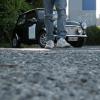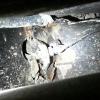Vinegar Numpty!
#1

Posted 23 October 2013 - 09:10 PM
#2

Posted 23 October 2013 - 09:19 PM
sounds like it was very rusty ?
normal vinegar only eats rust - won't touch clean steel -
I wonder if vinegar left in a damp environment will absorb water ?
it will certainly get weak the more it is used
once taken out of vinegar , rinse with water & dry very quickly - it will rust rapidly until treated in some way like wd40 , paint etc
also I have found - if wire brushing something , dab some vinegar on first , give it a min , then wire brush off
- the rust comes off quicker
Edited by sledgehammer, 23 October 2013 - 09:22 PM.
#3

Posted 23 October 2013 - 09:20 PM
Safe to say keep your vinegar for your fish and chips ![]()
#4

Posted 23 October 2013 - 09:34 PM
You left it too much in vinegar, probably the acid has gone and the water rusted the steel
#5

Posted 23 October 2013 - 09:42 PM
#6

Posted 26 October 2013 - 02:37 PM
Different acids can be used to remove rust. With all of them, time of exposure can be critical. I have seen that steel and iron parts with higher carbon content (such as case hardened parts) are more aggressively attacked by acid... leaving them with a rough, pitted surface if left unattended too long. It could be that your damaged caliper had higher carbon than the one that was less affected.
WIth a caliper there are two areas to really be concerned with, the piston bore seal glands and the bleed nipple seats. If the other surfaces are rough and pitted it doesn't matter quite as much. (If you split the caliper you also have to worry about the tapped holes and the sealing washer surface between the two halves). The seal glands in the piston bores must have good, sound walls for the square cut rubber seals to seat against. The piston bores themselves can have some pitting as no sealing takes place on those walls. However, big/massive pitting of the bores would be a problem as there will be less support surface for the piston itself. It should go without saying that severe etching of the bleed nipple seat would be a problem as you could never get it to seal. If your damage was not in the sealing areas, multiple applications of primer followed by sanding and top coat painting should leave the caliper in presentable and serviceable condition.
Regardless, it is important to frequently monitor what is going on with parts soaked in acid. So the parts all behave the same (or close to the same) it is best to thoroughly degrease them carefully and well and put groups of similar parts in the acid bath at the same time. Check them frequently and remove them at the first sign that a critical surface is being adversely affected.
#7

Posted 26 October 2013 - 02:42 PM
I posted this before... I saw a topic showing how to use vinegar to remove rust from brake cylinders... so i tried it.
The general census was that I was a t**t ![]() Still have loads of vinegar left in the shed
Still have loads of vinegar left in the shed ![]()
#8

Posted 26 October 2013 - 03:11 PM
#9

Posted 26 October 2013 - 08:07 PM
But yer right about time leaving it in acid for...
Used this on an old bike bottom bracket years ago... Worked a treat...
#10

Posted 27 October 2013 - 12:15 AM
Rinsing with bicarbonate dissolved in water should neutralize the acid and certainly won't hurt. However, rinsing with clean water followed by wiping and drying the surface should suffice also.
#11

Posted 27 October 2013 - 11:07 AM
Here is a picture of the two calipers that I soaked in vinegar. You can easily see how its effected the surface of the metal. This one is now for the bin as the edge of metal that holds in the outer piston seal has been eaten away so I don't think it'll be safe to use. I'm on the lookout for a new drivers caliper now!
 DSC_0250 (2).jpg 125.45K
34 downloads
DSC_0250 (2).jpg 125.45K
34 downloads
#12

Posted 27 October 2013 - 01:36 PM
Could it have been that in the past one of the calipers was replaced with a new one therefore when soaked in vinegar the older one looks worse.
#13

Posted 27 October 2013 - 01:42 PM
#14

Posted 27 October 2013 - 01:46 PM
My fav choice is phosphoric acid, about 30% acid 70% water, works a treat
#15

Posted 27 October 2013 - 03:10 PM
My fav choice is phosphoric acid, about 30% acid 70% water, works a treat
That is also what I use. I buy a gallon of it pre-mixed from a local agricultural supply house as needed.
1 user(s) are reading this topic
0 members, 1 guests, 0 anonymous users





















